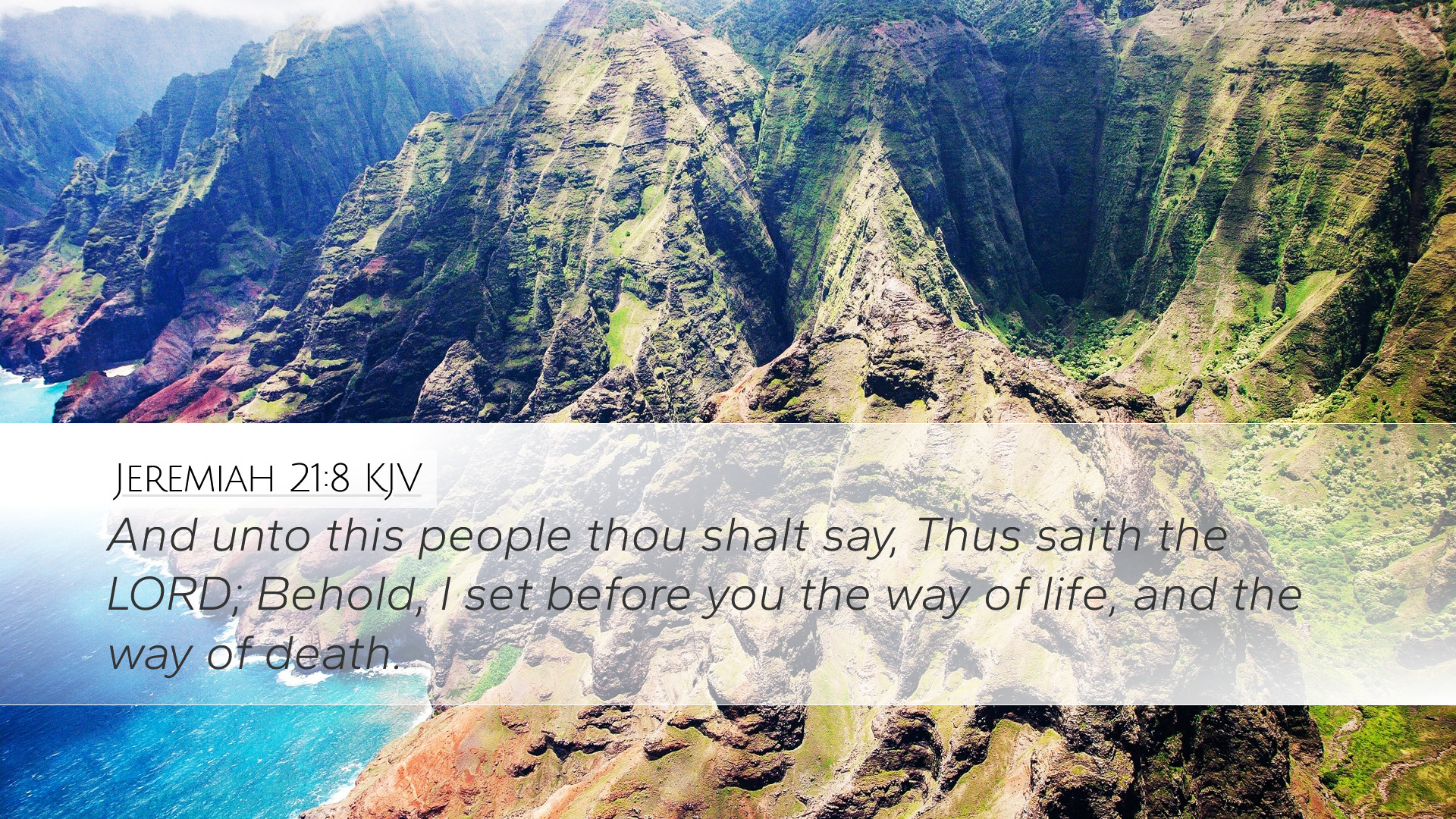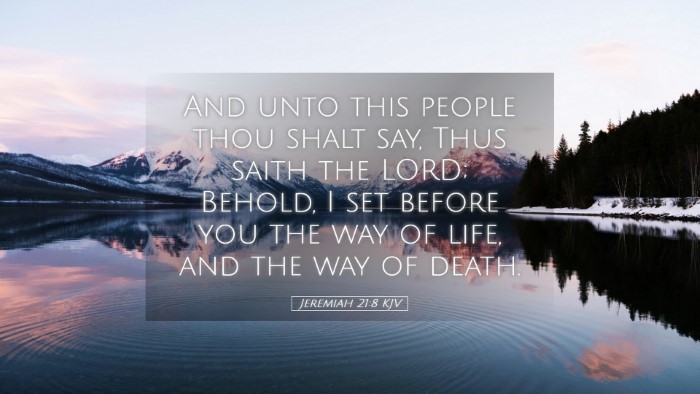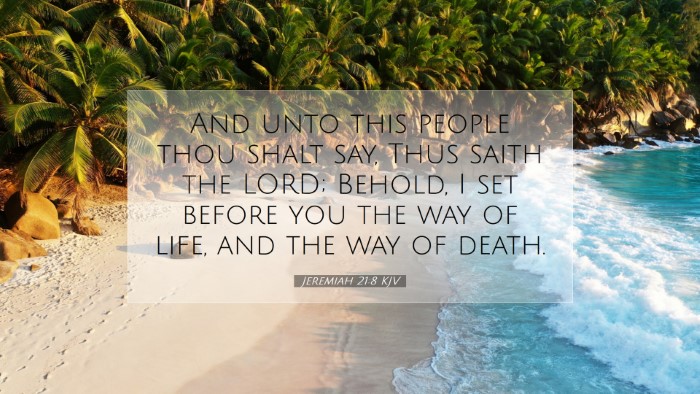Commentary on Jeremiah 21:8
Verse: "And unto this people thou shalt say, Thus saith the LORD; Behold, I set before you the way of life and the way of death." (Jeremiah 21:8 KJV)
Introduction
The prophetic book of Jeremiah provides profound insights into the relationship between God and His people, particularly during periods of impending judgment. Jeremiah 21:8 presents a critical choice before the people of Judah as they face the consequences of their actions. This commentary draws from the rich reservoir of insights found in public domain works by esteemed scholars such as Matthew Henry, Albert Barnes, and Adam Clarke.
Understanding the Context
Before diving into the verse, it's essential to understand its context. Jeremiah prophesies during a time of siege by the Babylonians, where the city of Jerusalem is on the brink of destruction. The specific pronouncement made in this chapter emphasizes the necessity for the people to understand their dire situation and the choices available to them.
Historical Background
The reign of King Zedekiah marked a period of great turmoil for the nation of Judah. Despite previous warnings from Jeremiah and other prophets, the populace continued in their rebellious ways, engaging in idolatry and injustice. Thus, God conveys through Jeremiah the serious implications of their choices.
The Message of Life and Death
This verse encapsulates a fundamental principle of theology: the choices between life and death, righteousness and unrighteousness. Here are insights drawn from various commentaries:
1. Matthew Henry's Perspective
Matthew Henry elaborates on the divine declaration made to Jeremiah. He posits that God's message serves as a clear ultimatum: adherents of His laws will find life, whereas those who reject His guidance will inevitably face death. Henry emphasizes the moral responsibility of individuals to choose wisely, underlining that God's instructions are for their welfare and not for their destruction.
2. Albert Barnes' Reflection
Albert Barnes elucidates that this verse highlights the covenant dynamics between God and the Israelites. He reflects on the idea that God does not coerce; rather, He offers a choice. Barnes underscores that this offer of life is extended to all—implying that even in judgment, grace is available. The "way of life" represents obedience to God's commandments, while the "way of death" signifies rebellion and sin, leading to destruction.
3. Adam Clarke's Insights
Adam Clarke navigates through the linguistic aspects of the verse, noting that the terms "life" and "death" are not mere physical descriptions but carry spiritual implications as well. Clarke draws connections to the teachings of Jesus Christ, who later delineates similar paths in the New Testament. His commentary encourages believers to pursue life through faith and adherence to God’s word, portraying a holistic view of salvation and judgment.
Theological Implications
This verse not only serves as a historical warning but holds theological weight for the contemporary audience. It imparts lessons crucial for pastors, students, and theologians alike:
- The Sovereignty of God: The declaration is clear—God holds authority over life and death, indicating His sovereignty in the affairs of humanity.
- The Reality of Choice: Just as Judah faced a choice, so do individuals today. The freedom to choose is integral to the concept of faith; true faith is a response to God's call.
- The Urgency of Repentance: Given the dire consequences of disobedience, there is an urgent call for self-examination and repentance. The choice presented underscores the immediacy of the decision to align oneself with God.
Exposition of the Choices
Jeremiah 21:8 lays out two distinct paths, each with significant consequences. Let’s explore these pathways further:
1. The Way of Life
The "way of life" is characterized by:
- Obedience to God's Law: This entails walking in accordance with God’s commandments and teachings.
- Faithfulness: A commitment to trust in God and His promises, embodying a life of faith.
- Community Restoration: Encouraging a return to righteousness and justice among the people, ensuring the well-being of the society.
2. The Way of Death
Conversely, the "way of death" includes:
- Rebellion Against God: Choosing to disregard His commandments leads to spiritual and eventual physical death.
- Idolatry: Engaging in practices that elevate creation over the Creator, resulting in separation from God.
- Despair and Destruction: The ultimate outcome of walking this path is societal decay and personal despair.
Conclusion
Jeremiah 21:8 serves as a poignant reminder of the choices we face in our spiritual journeys. The insights drawn from public domain commentaries reveal a multi-faceted understanding of this text, emphasizing the grace offered by God amidst impending judgment. For pastors, theologians, and students, this passage not only prompts deep reflection on the nature of divine calls but also encourages active participation in the way of life through obedience, faith, and community engagement. May we heed the words of this prophet and choose wisely in our walk with the Lord.


